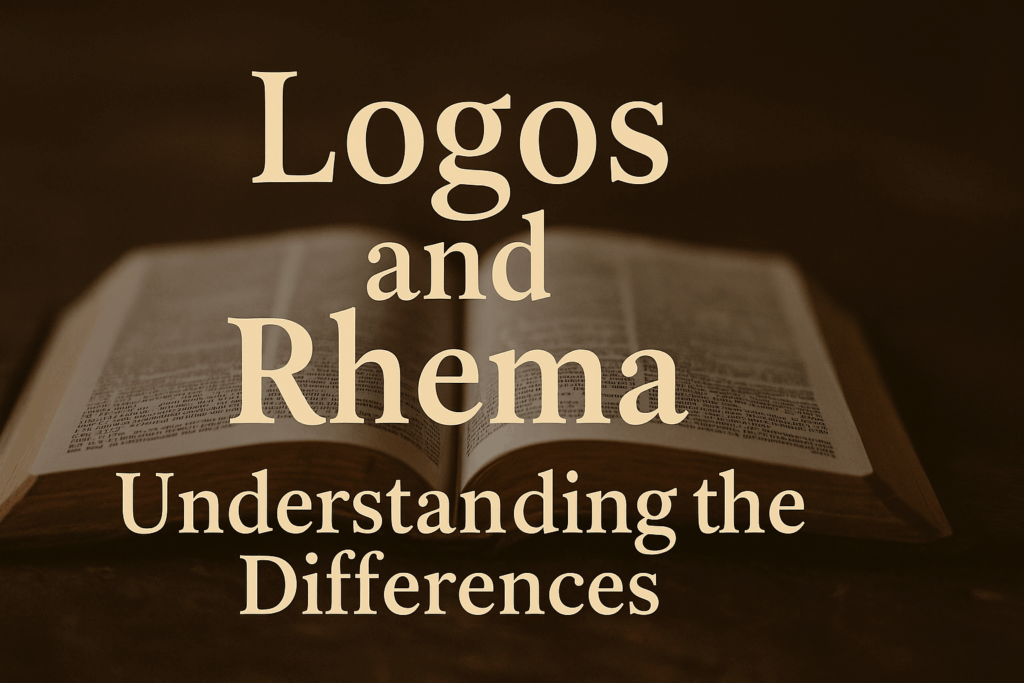
Understanding the Written Word of God and Its Role in Your Faith Journey
Have you ever heard someone say, “God gave me a Rhema word” or “This is from the Logos”?
I did, and it was when I was new to the Christian faith. I had no clue what they were talking about. It confused me. All I knew was that the whole Bible was God’s Word and that it was as if God were speaking to me when I read the Bible.
As I grew in maturity, I realized, there actually is such a thing as Logos and Rhema. So what is Logos?
These words—Logos and Rhema—aren’t just fancy Greek terms. They carry deep meaning in how we understand the Bible and how we hear from God. If you’re serious about growing in your relationship with Jesus and want to be rooted in the Word, understanding the difference between Logos and Rhema is essential.
What does Logos mean?
Logos is a Greek word that simply means “word,” “message,” or “reason.” In the context of Scripture, Logos refers to the written Word of God—the Bible in its entirety, inspired and breathed by God.
It is the structured, recorded revelation of God’s truth meant for all people, for all time. The printed letters in the Bible is Logos.
One of the most well-known verses that uses the word Logos is:
“In the beginning was the Word (Logos), and the Word was with God, and the Word was God.” – John 1:1
Here, in this particular instance, Logos isn’t just referring to the written Word, but to Jesus Christ Himself—the ultimate revelation of God. In the beginning was the Logos, and this logos became flesh. Jesus is the Word that was made flesh (John 1:14), and He embodies the entirety of God’s message to humanity.
So, when we read the printed text in the Bible, we are engaging with the Logos—God’s general, eternal Word that reveals His character, His will, His promises, and His plan for salvation.
What does Rhema mean?
Rhema is another Greek word that also translates to “word,” but in a more specific and personal way. Rhema refers to the spoken word of God, a specific message revealed by the Holy Spirit to a person for a particular situation.
Think of Rhema as when a Bible verse jumps off the page and speaks directly to your heart in a moment of need. The verse may be from the Logos (written Word), but when the Holy Spirit makes it alive and personal to you, it becomes a Rhema word.
When you get into the discipline of daily Bible Study, you will begin to notice that the Holy Spirit will bring to your remembrance certain verses in your time of need. That is Rhema.
The Difference Between Logos and Rhema
| Logos | Rhema |
|---|---|
| Written Word of God (Bible) | Spoken or revealed Word by the Spirit |
| General truth for all believers | Specific word for a specific time |
| Timeless, foundational | Timely, personal |
| Example: John 3:16 is Logos | The Holy Spirit reminding you of John 3:16 in a moment of doubt is Rhema |
Both Logos and Rhema are equally from God. But knowing the difference helps you discern what God may be speaking to you in the moment, versus what He has already declared in His Word for all.
Why Knowing The Difference Matters To You
You might wonder, “Isn’t all of it just God’s Word?” Yes, but here’s why knowing the difference really helps in your walk with God:
- It Helps You Recognize When God Is Speaking Personally to You – Let’s say you’re reading the Bible and come across Philippians 4:6 — “Do not be anxious about anything…” You’ve read it many times before. But today, it hits different. You’re in a tough situation, and suddenly you feel peace. That’s the Logos turning into Rhema. Knowing the Logos grounds you. But experiencing Rhema grows your trust and intimacy with God.
- It Keeps You Rooted And From Deception – There are many people who claim to have “heard from God,” but if what they say doesn’t line up with the Logos, it’s not from God. The Rhema word will never contradict the Logos. This keeps you spiritually safe and grounded in truth.
- It Encourages And Increases Your Faith in Everyday Life – Romans 10:17 says: “Faith comes by hearing, and hearing by the word (Rhema) of God.” This verse shows that it’s often the Rhema word—when the Holy Spirit makes something from Scripture alive to you—that fuels faith in your heart. You might be feeling afraid, and a verse “I will never leave you nor forsake you” comes alive reminding you that God is with you. That Rhema builds faith and strengthens your heart for the moment.
- It Deepens Your Relationship with God – Reading the Bible daily (engaging with the Logos) helps you know God’s ways, His voice, and His promises. But when the Holy Spirit quickens a specific part to you (a Rhema), it becomes a very personal and powerful experience of God speaking into your life. Over time, this process trains your heart to hear Him more clearly and obey more quickly.
In conclusion, Knowing the difference between Logos and Rhema doesn’t just expand your Bible knowledge—it deepens your spiritual walk. Logos gives you a foundation; Rhema gives you direction. Logos teaches you who God is; Rhema reminds you He is with you. Logos builds faith; Rhema ignites it.
So next time you open your Bible, remember: You’re holding the Logos. And as you read, be ready—because the Rhema might just meet you where you are.
Talking about Logos, there is a very popular Bible App called Logos that many preachers and students serious about Bible Study use. Look it up on your app store or Google play store. It is not free, but worth the cost if you can afford it.
